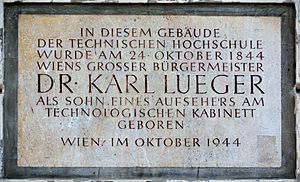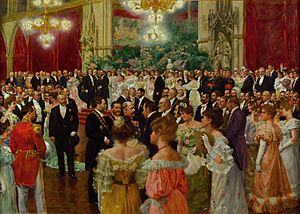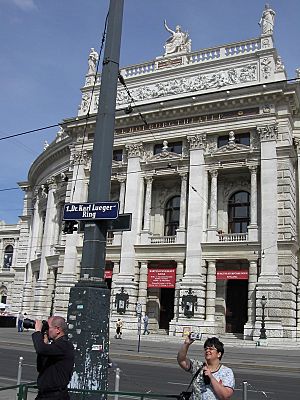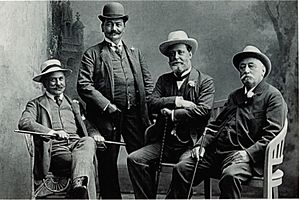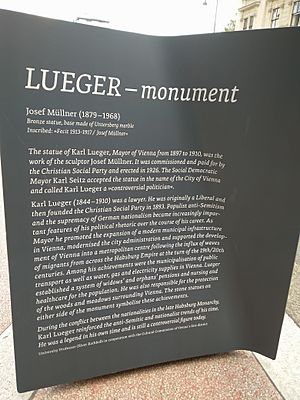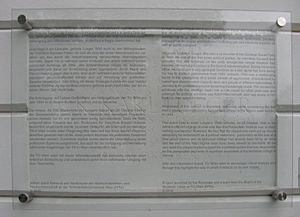Karl Lueger facts for kids
Quick facts for kids
Karl Lueger
|
|
|---|---|
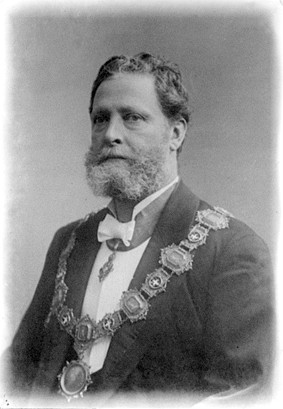
Photograph by Ludwig Grillich, c. 1897
|
|
| Mayor of Vienna | |
| In office 8 April 1897 – 10 March 1910 |
|
| Preceded by | Josef Strobach |
| Succeeded by | Josef Neumayer |
| Personal details | |
| Born | 24 October 1844 Wieden, Austrian Empire (current-day Austria) |
| Died | 10 March 1910 (aged 65) Vienna, Austria-Hungary (current-day Austria) |
| Political party | Christian Social Party |
| Profession | Lawyer |
Karl Lueger (born October 24, 1844 – died March 10, 1910) was an Austrian lawyer and politician. He served as the Mayor of Vienna from 1897 until his death in 1910. Lueger is known for helping to change Vienna into a modern city around the start of the 20th century. However, his political ideas, which included being a populist and antisemitic, remain a topic of debate. He founded and led the Austrian Christian Social Party (CS). Some people even see his politics as influencing Adolf Hitler's Nazism.
Contents
Early Life and Career
Karl Lueger came from a humble family. He was born in Wieden, which is now the 4th district of Vienna. His father, Leopold Lueger, worked as an usher at the Vienna Polytechnic.
Lueger's birthplace is now part of the main building of the Vienna University of Technology at Karlsplatz. Despite his family's modest background, he was able to attend the famous Theresianum boarding school as a day student.
He later studied law at the University of Vienna, earning his doctorate degree in 1870. During his time at the university, he was a member of a Catholic student group called K.A.V. Norica Wien.
In 1874, Lueger opened his own law office in Vienna. He quickly became known for defending "little people," meaning ordinary citizens. He looked up to Ignaz Mandl, a popular Jewish doctor and local politician. Mandl was known as "God of the Little People" in Lueger's area. Lueger followed Mandl into politics. However, their connection ended when Lueger became known for his antisemitism, which means prejudice against Jewish people.
Political Journey
Lueger was active in many areas of politics. This included the Vienna City Council, where he eventually became mayor. He also served in the federal Austrian parliament and the state parliament of Lower Austria.
Vienna City Politics
In 1875, Lueger was elected to Vienna's City Council (Gemeinderat). He started as a liberal politician. He served on the council until his death, except for a short break from 1876 to 1878. Lueger became popular by campaigning against the government and fighting corruption.
In 1888, he brought together different political groups in City Hall. These groups later became known as the United Christians.
After the 1895 elections, Lueger's Christian Socials won a large majority of seats in the Vienna Gemeinderat. They elected Lueger as mayor. However, in those times, the emperor had to approve the mayor. Emperor Franz Joseph disliked Lueger and worried about his antisemitism. With support from the Prime Minister, the emperor refused to approve Lueger as mayor. The Christian Socials re-elected Lueger three more times, but the emperor kept refusing. Finally, in 1897, after Pope Leo XIII personally asked the emperor, Lueger's election was approved.
Lueger was a very devoted Catholic. He wanted to make Vienna one of the most beautiful "garden cities." He also made sure that Czech immigrants were treated well.
Modernizing Vienna
As mayor, Lueger made many important changes to Vienna. He extended the public water supply, bringing high-quality tap water to much of the city. He also took control of the gas and electricity companies for the city. Lueger created a public transport system by introducing streetcars (trams). He also set up many social welfare programs, which helped people in need.
He brought the suburbs into the city and built new parks, gardens, hospitals, and schools.
Lueger was very popular among the citizens. People called him Der schöne Karl ("handsome Karl"). During his time as mayor, Vienna truly became a modern capital city. Many of the important services and organizations that make Vienna a great place to live today were started during his time in office.
Lueger served as mayor until he died from diabetes mellitus in 1910. He was buried in the crypt of the St. Charles Borromeo Church at the Zentralfriedhof.
Christian Social Movement
Lueger's early political life was linked to Georg Ritter von Schönerer and the German National Party, which was antisemitic. From the late 1880s, Lueger regularly attended meetings with important Catholic social politicians. They discussed how to help society based on Catholic social teaching.
Lueger realized that talking about the "Jewish Question" made him very popular, especially among small business owners who felt threatened by Jewish competition.
In 1885, he was elected to the Austrian Imperial Parliament. He was also a member of the Lower Austria parliament from 1890.
Lueger and his group met regularly and developed the ideas for the Christian Social Party (CS). Lueger founded and led this party in 1893. It quickly became a major rival to the Social Democrats. He remained a strong leader until his death.
Lueger was very popular with women. His female supporters were called "Lueger's Amazons" or "Lueger Gretls." Even though women could not vote, Lueger knew they could influence how their male family members voted. They also taught the party's ideas to their children. To keep his female followers, Lueger remained unmarried. He claimed he was too busy and belonged completely to "my Viennese." After he died, his long-time partner, Marianne Beskiba, published a book about their relationship.
Antisemitism and Legacy
Lueger was known for his antisemitic speeches. He even said he admired Edouard Drumont, who started the Antisemitic League of France. Years later, Adolf Hitler, who lived in Vienna from 1907 to 1913, saw Lueger as an inspiration for his own anti-Jewish ideas.
However, some historians believe that Lueger's public racism was largely a way to gain votes. He was one of the first politicians to use populism as a political tool. Historian William L. Shirer wrote that Lueger's opponents, including Jews, often agreed that he was a "decent, chivalrous, generous and tolerant man" at heart.
According to Amos Elon, Lueger's antisemitism was "flexible." When asked why many of his friends were Jewish, Lueger famously replied, 'I decide who is a Jew.' The Viennese writer Stefan Zweig, who grew up during Lueger's time as mayor, remembered that "His city administration was perfectly just and even typically democratic."
Lueger's political style later influenced some right-wing leaders in Austria between 1918 and 1933. These leaders, like Ignaz Seipel and Engelbert Dollfuss, were not particularly antisemitic. However, Lueger's strong and determined approach to political opponents served as a model for them.
In Vienna, a square is named after Lueger, and there are at least two statues honoring him. Until 2012, a part of the famous Ringstraße also carried his name. Deciding what to do with monuments honoring historical figures whose reputations are questioned, especially concerning the Holocaust, has been difficult. Lueger's monuments are a complex case because he was a local hero, but he also inspired the Nazis.
Some people feel that the Lueger monuments show Vienna has not fully addressed its past concerning the Holocaust. For example, when Austrian-born scientist Eric Kandel won the Nobel Prize in 2000, he said it was a "Jewish-American Nobel," not an Austrian one. He was upset that the University of Vienna was on a street named after Lueger. After many debates, the street was renamed Universitätsring in April 2012. The monument to Lueger and the memorial plaque at the TU Wien now have descriptions. These descriptions explain Lueger's antisemitism and his influence on National Socialism.
Lueger was the subject of a 1943 movie called Vienna 1910. In the film, he was played by Rudolf Forster.
Honors and Awards
Karl Lueger received many awards and honors during his lifetime:
 Austria-Hungary: Grand Cross of the Order of Franz Joseph, 1907
Austria-Hungary: Grand Cross of the Order of Franz Joseph, 1907 Kingdom of Bavaria: Grand Cross of the Merit Order of St. Michael
Kingdom of Bavaria: Grand Cross of the Merit Order of St. Michael Belgium: Grand Officer of the Order of Leopold, with Star
Belgium: Grand Officer of the Order of Leopold, with Star France: Commander of the Legion of Honour
France: Commander of the Legion of Honour Holy See:
Holy See:
- Grand Cross of St. Gregory the Great
- Cross of Honour "Pro Ecclesia et Pontifice"
 Ottoman Empire: Order of the Medjidie, 1st Class
Ottoman Empire: Order of the Medjidie, 1st Class Persian Empire: Order of the Lion and the Sun, 2nd Class with Star
Persian Empire: Order of the Lion and the Sun, 2nd Class with Star Kingdom of Prussia: Knight of the Red Eagle, 1st Class in Diamonds
Kingdom of Prussia: Knight of the Red Eagle, 1st Class in Diamonds Kingdom of Romania: Grand Cross of the Crown of Romania
Kingdom of Romania: Grand Cross of the Crown of Romania Russian Empire: Knight of St. Stanislaus, 2nd Class with Star
Russian Empire: Knight of St. Stanislaus, 2nd Class with Star Kingdom of Saxony: Commander of the Albert Order, 1st Class with Star
Kingdom of Saxony: Commander of the Albert Order, 1st Class with Star Spain: Grand Cross of Isabella the Catholic, 19 October 1906
Spain: Grand Cross of Isabella the Catholic, 19 October 1906
 Sweden-Norway: Commander Grand Cross of the Polar Star
Sweden-Norway: Commander Grand Cross of the Polar Star United Kingdom: Honorary Commander of the Royal Victorian Order, 9 October 1903
United Kingdom: Honorary Commander of the Royal Victorian Order, 9 October 1903
See also
 In Spanish: Karl Lueger para niños
In Spanish: Karl Lueger para niños
 | James Van Der Zee |
 | Alma Thomas |
 | Ellis Wilson |
 | Margaret Taylor-Burroughs |


